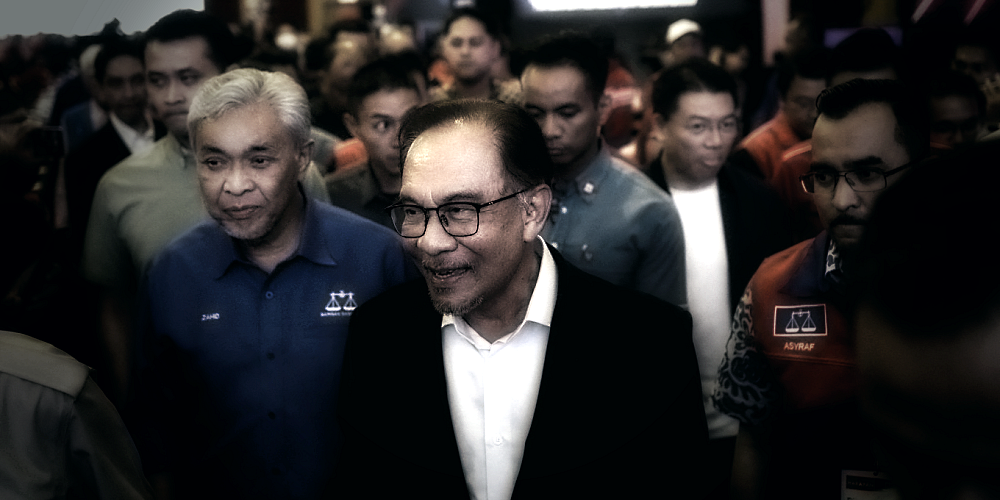Malaysian voters deserve praise and respect from their neighbors, many of whom are still struggling to have their voices heard by their own governments, for their political maturity, which permits the country to define its direction, as demonstrated in the peaceful and fair by-elections on Saturday.
The voters reconfirmed their mandate to the Unity Government of Prime Minister Anwar Ibrahim to continue realizing its campaign promises of economic reforms, greater equality between rich and poor and improved well-being of the population.
People in the region, including Malaysians, probably are unaware or tend to overlook the fact that compared with the other nine Asean member states, Malaysia is an excellent example of a nation that is relatively free from the influence or domination of the military, which is perceived as a symbol of stability and discipline and as a precondition for development.
The stability of Anwar’s government is crucial for Malaysia and Asean, especially because neighboring Indonesia and Singapore will elect new leaders in the coming two years.
Indonesia will hold legislative and presidential elections in February 2024, and Singapore a parliamentary election in 2025, during which PM Lee Hsien Loong is expected to hand the baton to his deputy Lawrence Wong.
Despite its imperfections, Malaysian democracy sets a good example for other Asean members that maintain military dictatorships or resist civil liberties.
In fact, the Asean Community 2025, which envisions a region that values freedom, remains merely a paper commitment.
In the August 12 elections, Malaysian voters opted to maintain the status quo of Anwar’s ruling coalition and the conservative Muslim opposition in three strategic states.

The elections were widely regarded as a referendum on Anwar, who came to power in November last year, and the opposition’s resilience.
Anwar’s Pakatan Harapan and the Barisan Nasional coalition won in its three strongholds of Penang, Selangor and Negeri Sembilan, although the opposition took more seats there.
The opposing coalition of Perikatan Nasional maintained its control in Kedah, Kelantan and Terengganu.
Opposition leader Muhyiddin Yassin, a former prime minister, insisted that Anwar step down after the opposition won 60 percent of the total assembly seats in the six states.
The election results allowed Anwar a sigh of relief because his federal government can now complete its five-year term until 2027.
Malaysia’s political stability under Anwar will certainly attract investors and reassure the business community.
Anwar won prime ministerial office with a promise to focus on economic and institutional reforms, increasing taxes for the wealthy, and facilitating more accessible company-listing rules.
One of his platforms, to abolish the death penalty, however, still faces resistance from the public, who deem capital punishment as an effective deterrent against drug crimes.
“This is the time for everyone, for all the parties, whether they win or lose, to work together to protect national peace, raise the country’s dignity and concentrate on developing Malaysia,” Anwar said in an appeal after learning the election result.
Anwar’s Pakatan Harapan alliance won the most seats in November but failed to win a majority.
At the mandate of King Al-Sultan Abdullah, Anwar could form his government after forming a coalition with the once-powerful United Malays National Organization (Umno) and other smaller parties.
Anwar has been the center of political controversy since 1998. He was widely seen as the immediate successor of then-prime minister Mahathir Mohammad before his mentor sacked and even jailed him on corruption and later sodomy charges.
Anwar remains favored for his multi-ethnic, inclusive and tolerant creed. But many Malays view him as not just too liberal but also too pro-minority groups, especially the Chinese and Indians.
By constitution, all Malays are Muslims, and Islam is the official religion in Malaysia. More than two thirds of the population are Malay, but the minority groups control the economy.
We hope the legitimacy the Malaysian people have given to Anwar at least until 2027 will bring unity to the multi-ethnic country and prosperity for all, as he promised during last year’s election campaigns.
ADVERTISEMENT
ADVERTISEMENT








































